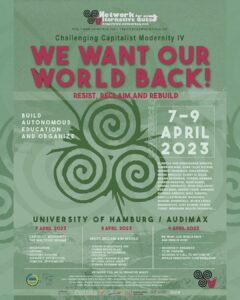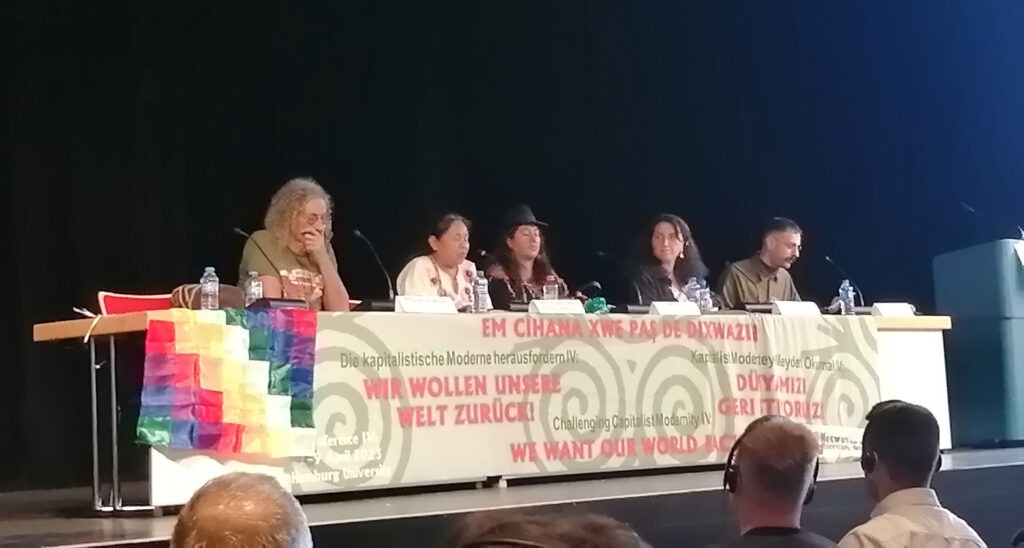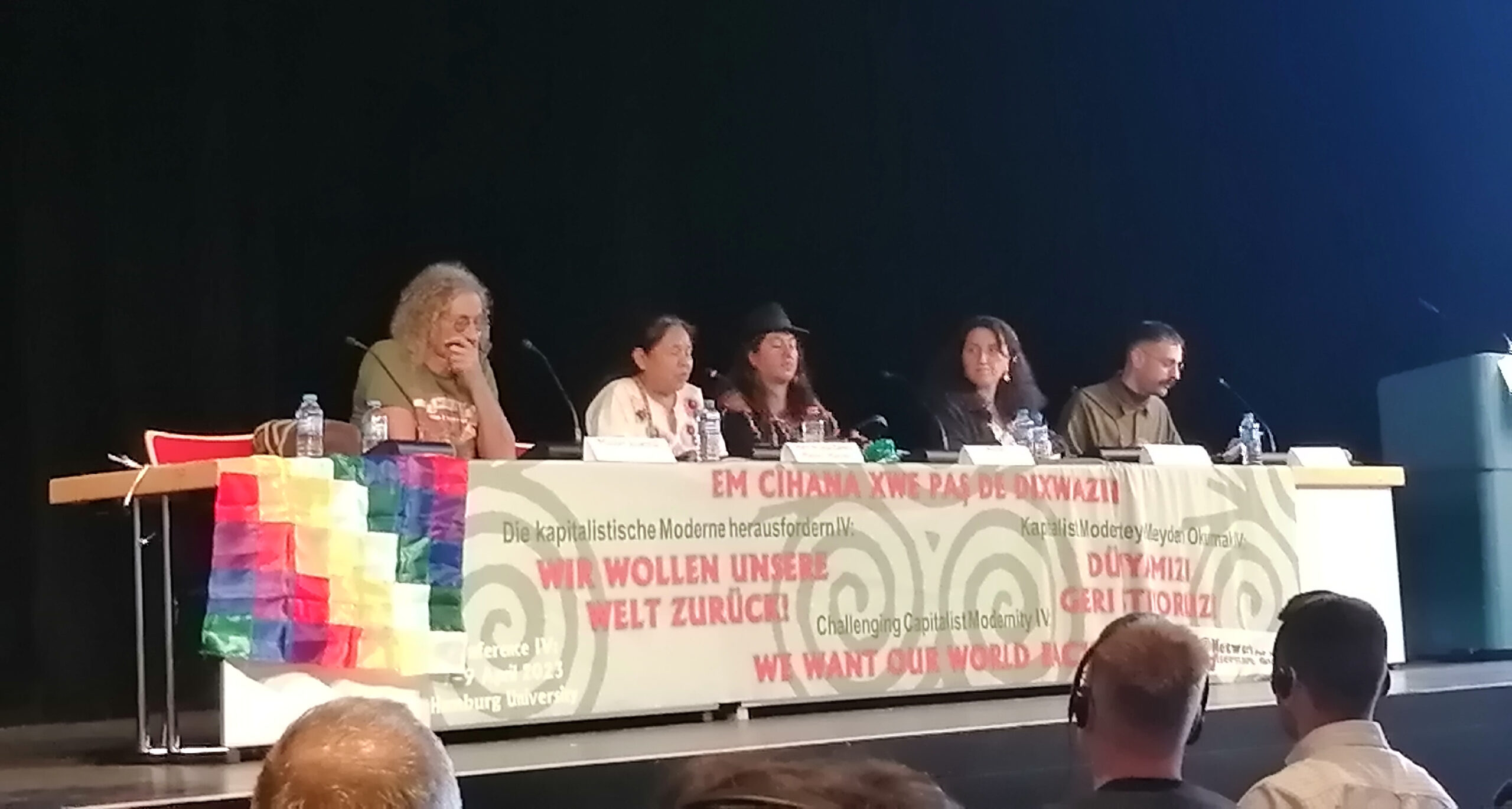Despite attempts at repression, the 2023 “Challenging Capitalist Modernity” conference in Hamburg brought together over a thousand activists and academics from all over the world for three days of utopian discourse.
Like the previous three iterations, this year’s conference connected the Kurdish struggle with broader deliberations about a world free from oppression, patriarchy and ecological destruction. Much had changed since the last conference in 2017: Back then all eyes were on the Kurdish fighters repelling the Islamic State in Rojava. In the meantime the main threat has shifted to the Turkish state, which since then has attacked the self-governed territories in North and East Syria twice and continues to drench the whole region in warfare.
And it turns out that the long arm of NATO member Turkey reaches as far as the city of Hamburg in the north of Germany. One week before the conference was to be held, the University of Hamburg withdrew the permission to use their conference hall. The reason was a letter from the “Verfassungsschutz”, the Federal Office for the Protection of the Constitution, in which the University was advised to cancel the conference. Although it was just a letter, not a legally binding document, and a clear attack on the freedom of science, the principal bowed to the pressure. To understand this, one has to know that the German state has been repressing the Kurdish movement for years, since Turkey is one of Germany’s most important business partners. On top of that Turkey uses its capacity to prevent refugees from migrating westward as a means to blackmail European states into complying to its political demands.
 Luckily the organizers, the Network for an Alternative Quest, the Student Comittee of the University of Hamburg and the International Initiative for Freedom for Abdullah Öcalan–Peace in Kurdistan, were able to find another location that was large enough to accommodate the 1300 participants. On the morning of April 7th the lobby of the “Bürgerhaus Wilhelmsburg” was bustling with people from all over the world – activists, scientists, students, members of local organizations, Kurdish and internationalist youth communes, young people from the climate movement, left-green communal politicians, visitors from the USA, from India, Brazil, Italy and other countries. Moving between them were volunteers from Kurdish and student organizations as well as self-organized ad hoc groups making sure that every guest got what they needed. The atmosphere inside the building was warm, welcoming and respectful, in stark contrast to the statist, capital-driven realities outside.
Luckily the organizers, the Network for an Alternative Quest, the Student Comittee of the University of Hamburg and the International Initiative for Freedom for Abdullah Öcalan–Peace in Kurdistan, were able to find another location that was large enough to accommodate the 1300 participants. On the morning of April 7th the lobby of the “Bürgerhaus Wilhelmsburg” was bustling with people from all over the world – activists, scientists, students, members of local organizations, Kurdish and internationalist youth communes, young people from the climate movement, left-green communal politicians, visitors from the USA, from India, Brazil, Italy and other countries. Moving between them were volunteers from Kurdish and student organizations as well as self-organized ad hoc groups making sure that every guest got what they needed. The atmosphere inside the building was warm, welcoming and respectful, in stark contrast to the statist, capital-driven realities outside.
The will to stand up against these adverse conditions – aptly named “capitalist modernity” by the Kurdish freedom movement – was a recurring theme at the conference which in its invitation announcement had called for “a collective stance to demand our world back”. John Holloway, renowned scholar and one of many international speakers, boiled it down to the “struggle of life against money”. Visibly shaking with indignation, he denounced the University of Hamburg and the “Verfassungsschutz”, exposing their fear: “They want to ban us because they are afraid of us and our ideas.” According to him, the “poor capitalists” are always in need of new solutions to intensify the exploitation of labor and to find a way “to control all these people”. The struggle for life against money on the other hand starts by saying “no, we cannot accept this any more!” And Holloway reassured his listerners: “We are not alone, there is a whole history of struggle.”

Which leads us to another theme that was mentioned in several panels: The image of weaving a social fabric, meaning the self-organization of communities that is, and always was, happening all over the world. Aymara activist Adriana Guzman Arroyo talked about how extractivism in Peru, Ecuador and Bolivia is destroying communities. The antidote, however, is not the takeover of the state, but our power to organize ourselves and overcome this “system of death” and ensure the “good life for all” (“buen vivir” in Spanish) by breaking with individualism. This also has an international dimension, which Guzman Arroyo called the “community of communities”.
This in turn corresponds to an idea that was developed on the other side of the globe: the model of democratic confederalism. Kurdish thinker Abdullah Öcalan describes it in his books as “a non-state political administration or a democracy without a state”, where decision making lies with the communities and higher levels only serve the coordination and implementation of the will of the communities who send their delegates to them.
“The paradigm”, a shorthand expression for the body of Öcalan’s ideas, was palpable during the whole three-day conference. Capitalist modernity versus democratic modernity, democratic confederalism against the nation-state system, feminism against patriarchy, social ecology against ecocide, these are among the key tenets of his political philosophy. All of these were picked up in the six main panels, which in some cases went on for several hours, and in countless workshops.
“Multicide” was featured prominently in the discussions, a term comprising not only genocide, but also ecocide, sociocide and epistemicide. In the case of Kurdistan, but really in all colonized territories, all of these are entangled: People are killed, communal relations are destroyed and alternative ways of life, even languages, are prohibited in order to extract value from the earth, leading to widespread ecocide. To confront multicide and capitalist modernity, resistance is not enough. We have to build a counter-modernity, as Kurdish lawyer and politician Ebru Günay stressed. We have to give back to society the ability to govern itself. Organizing, Günay said citing Öcalan, enlarges society and diminishes capitalist modernity. That again resonated with the speech of María de Jesús Patricio Martínez, who talked about the Zapatistas’ “juntas de buen gobierno”, the councils of the good government, that resemble the communes and assemblies of Rojava.
To implement this new society, we need new educational institutions, said Zozan Sima, who is helping to build a system of women’s academies that teach the Kurdish feminist theory or “women’s science” called Jineology. In a similar vein, US-based scholar-activist Andrej Grubačić voted for a world confederation of autonomous schools.
Other panels and workshop dealt with subjects as diverse as art, theater, Kurdish dance, Irish music as a form of resistance, Kurdish media, the education of the Zapatistas, mythology, stateless refugees – too many to mention all. From the perspective of social ecology three events were especially interesting: Janet Biehl talked about the upcoming movie about her travels in Rojava where she interviewed women in the Kurdish womens’ movement, Dimitri Roussopulous gave an introduction to decentralized politics in Montral, Canada, and Italian post-doc researcher Davide Grasso compared Murray Bookchin and Abdullah Öcalan in his presentation.
The conference ended with optimistic overtones and chants of “Jin, Jiyan, Azadî”–“woman, life, freedom”, the slogan of the Kurdish freedom movement. Havin Güneser, long-time activist and conference co-organizer, thanked Abdullah Öcalan who, although he is incarcerated and isolated, continues to inspire so many people. Another slogan she mentioned was “We are the 99 percent!”, maybe also as a reference to late David Graeber, who had attended the last conference in 2017 in person.
On the one hand, “Challenging Capitalist Modernity IV” with its subtitle “We want our world back!” made it clear that there is an urgent imperative to build a communal, non-hierarchical, feminist and ecological society. This is our only way out of our current ecological and political predicaments. On the other hand, the conference – and its international attendees from the Netherlands to the Amazon – gave hope that we can count on international solidarity. In the words of Edinburgh researcher Nik Matheou, we only have to pick up the threads of revolution and weave them together into the special fabric of world democratic modernity.
Marcel Suter is a European activist and a participant in the current social ecology mentorship program.


